#abu dhabi crown prince
Explore tagged Tumblr posts
Text
भारत की पहली यात्रा पर आएंगे संयुक्त अरब अमीरात के क्राउन प्रिंस, पीएम मोदी ने दिया था निमंत्रण
भारत की पहली यात्रा पर आएंगे संयुक्त अरब अमीरात के क्राउन प्रिंस, पीएम मोदी ने दिया था निमंत्रण #news #viral #trending #update #newspaper #breakingnews #currentaffairs #dailynews #newsletter #newspapers #newsupdate #People #Media #info #Journalism #Press
Delhi News: संयुक्त अरब अमीरात के क्राउन प्रिंस शेख खालिद बिन मोहम्मद बिन जायद अल नाहयान अगले हफ्ते भारत की 2 दिवसीय यात्रा पर आने वाले हैं। कुछ महीने पहले उन्हें प्रधानमंत्री नरेंद्र मोदी ने भारत आने का निमंत्रण दिया था। अबू धाबी के क्राउन प्रिंस शेख खालिद बिन मोहम्मद बिन जायद अल नाहयान ने पीएम मोदी के निमंत्रण को स्वीकार कर लिया है। अब वह आगामी 9-10 सितंबर को भारत की आधिकारिक यात्रा…
#abu dhabi crown#abu dhabi crown prince#abudhabi crown prince#Crown Prince#crown prince al nahyan of abu dhabi#crown prince of abu dhabi#crown prince of abu dhabi net worth#crown prince of abu dhabi sheikh mohamed bin zayed al nahyan#crown prince of dubai#Crown Prince of UAE#crownprince#first visit to India#meex china abu dhabi prince#melodi meme#Modi#modi 3#modi 3.0#modi in brunei#modi in gulf#modi in kyiv#modi in poland#modi ka bhashan#modi live#modi live news#modi live today#modi news#modi news live#modi news today#modi samachar#modi shorts
0 notes
Text


التقى سموّ الشيخ حمدان بن محمد بن راشد آل مكتوم، ولي عهد دبي، نائب رئيس مجلس الوزراء وزير الدفاع، اليوم الاثنين، معالي الشيخ عبدالله علي عبدالله الصباح، وزير الدفاع بدولة الكويت الشقيقة، وذلك على هامش أعمال معرض الدفاع الدولي آيدكس 2025 مع انطلاق دورته السابعة عشرة في أبوظبي.
H.H. Sheikh Hamdan bin Mohammed bin Rashid Al Maktoum, Crown Prince of Dubai, Deputy Prime Minister and Minister of Defence of the UAE, today met with Sheikh Abdullah Ali Abdullah Al-Sabah, Minister of Defence of Kuwait, on the sidelines of the 17th edition of the International Defence Exhibition (IDEX 2025) in Abu Dhabi.
Monday, 17 February 2025 الأثنين
14 notes
·
View notes
Text
youtube
18.07.2024 📢Sheikh Hamdan bin Mohammed: We pledge that we will faithfully fulfil our duties and responsibilities, unwaveringly uphold the interests of the union and its people and continue on the path that was set by our founding fathers. May Allah protect the UAE, its leadership and people. 🇦🇪 In front of UAE President His Highness Sheikh Mohamed bin Zayed Al Nahyan, and His Highness Sheikh Mohammed bin Rashid Al Maktoum, Vice President, Prime Minister and Ruler of Dubai .. His Highness Sheikh Hamdan bin Mohammed bin Rashid Al Maktoum, Crown Prince of Dubai, Deputy Prime Minister and Minister of Defence, and newly appointed ministers in the UAE's government are sworn in at Qasr Al Watan in Abu Dhabi.
23 notes
·
View notes
Text
Israel’s war against Hamas in Gaza—and the assassinations, tanker wars, and drone attacks it has provoked throughout the broader Middle East—means the Gulf states are on edge. As the U.S. election approaches, the region’s two powerhouses—Saudi Arabia and the United Arab Emirates (UAE)—might be expected to lean toward stability in the form of Vice President Kamala Harris, the Democratic nominee for president. But Harris’s policies may not bring the sort of stability that they desire.
Harris is likely to take a tougher stance on the conflicts in Sudan and Yemen and engage diplomatically with Iran, positions that are at odds with the two Gulf states’ geopolitical aspirations. Both countries, therefore, would likely prefer to see former President Donald Trump return to the White House. Trump’s transactional approach to diplomacy and disregard for political norms were vital to amplifying both Saudi Arabia’s and the UAE’s regional power.
This preference reflects a deeper strategic calculation. Under Trump’s previous administration, the Gulf states enjoyed unprecedented levels of U.S. support, including via arms deals and Washington’s hard-line stance against Iran. Harris’s expected approach to U.S. foreign policy presents a stark contrast. Although the Biden administration has maintained some tough positions on Iran, they are no match for the Trump era.
Harris would likely revive diplomatic engagements from the era of former President Barack Obama, shifting away from aggressive policies that have favored the Gulf states’ strategic objectives. The vice president argued in 2019, when she was a U.S. senator, that she would return to the 2015 Iran nuclear deal that Trump withdrew from, and that she would take whatever action was necessary to counteract Iran and its proxies and defend U.S. troops stationed in the region. Biden made a similar pledge during his 2020 presidential campaign, but the negotiations stalled for a variety of reasons.
Harris generally favors a more diplomatic and multilateral approach to regional dilemmas. Trump, by contrast, closely aligned himself with Gulf interests while in office, particularly on Iran and Yemen. In a potential second Trump presidency, Riyadh and Abu Dhabi see an opportunity to further bolster their regional ambitions.
Under Trump, Saudi Crown Prince Mohammed bin Salman began negotiating a megadeal with the United States. It would establish a security pact, civilian nuclear cooperation, and defense cooperation—including arms sales—between the two countries.
There was a catch, however: Saudi Arabia would have to normalize ties with Israel, contingent on significant progress toward Palestinian statehood. Those talks have been hampered by the ongoing war in Gaza.
While it has been referred to by commentators as a NATO-style agreement, the proposed pact is more similar to the defense treaty that the United States has with Japan. Unlike NATO’s Article 5, this deal stops short of guaranteeing an automatic U.S. military action in the event of an attack, allowing Washington some discretion in how much support it gives Saudi Arabia.
By all accounts, Harris is more likely to limit the scope of U.S. security commitments to Riyadh—and adhere to established regulations—than Trump. In 2019, during Trump’s administration, Saudi Arabia suffered an attack on two Aramco oil installations. In response, the United States deployed additional troops, missile defense systems, and radar equipment to Saudi Arabia. Mohammed bin Salman is convinced that Trump’s willingness to provide unconditional support for Saudi security interests makes a formalized deal with the United States more feasible, even if the two-state solution remains a sticking point.
The Saudi crown prince seeks a military edge over his regional neighbors. The defense component of the agreement aims to bolster U.S.-Saudi military ties through joint training, advisory programs, and increased arms sales. Riyadh is keen to secure advanced air defense systems to counter drone and missile threats from regional adversaries, particularly Iran and its so-called axis of resistance.
Trump has a track record of delivering: In 2017, his administration facilitated a major arms deal with Riyadh, potentially worth $110 billion. This move may have significantly bolstered Saudi military capabilities and regional dominance. (Some analysts have argued that this figure was exaggerated, noting that much of the package consisted of informal letters of intent or interest rather than contracts.)
In 2021, by contrast, Biden froze military sales to Saudi Arabia as part of a broader reassessment of U.S.-Saudi relations, citing concerns over the “humanitarian and strategic catastrophe” in Yemen. While military sales were restarted in 2024, with Washington citing escalating regional threats from Iran and Houthi forces, analysts have argued that Harris may impose greater scrutiny on arms sales to Riyadh, given her votes against Saudi arms sales while in the Senate.
Saudi Arabia also has nuclear ambitions—and the deal seeks to advance Riyadh’s goal of building a civilian nuclear program, akin to Iran’s. But the U.S. Senate and the international community have expressed concerns that the kingdom could eventually use that technology and infrastructure to develop nuclear weapons.
These fears are not unfounded: Mohammed bin Salman has explicitly argued that if Iran develops nuclear weapons, Saudi Arabia would follow suit.
During the Trump presidency, however, members of the administration and U.S.-based nuclear firm Westinghouse are alleged to have held private negotiations with Saudi Arabia with minimal oversight, according to a report published in 2019 by Democrats in the House of Representatives. This signaled that Trump might be willing to assist Riyadh in developing nuclear infrastructure.
While Riyadh has always seen Tehran as its major regional threat, it was Mohammed bin Salman who advanced an explicitly aggressive and confrontational position against Iran. Trump’s withdrawal from the Iran nuclear deal and new punitive measures significantly dented Iran’s economy; he positioned his administration as a key ally in curbing Iran’s regional influence.
Although Saudi Arabia and Iran have enjoyed official détente since 2023 thanks to a deal that China sponsored, Riyadh still perceives Tehran as the most significant threat to its security and regional ambitions. Harris’s signaling that she is willing to restart talks with Tehran and rejoin the nuclear deal may pose a strategic concern and dilemma for Riyadh—and could also reignite fears among Gulf countries of Iranian regional dominance.
The UAE’s preference for Trump is rooted in Crown Prince Mohammed bin Zayed’s diplomatic, security, and geopolitical considerations. Abu Dhabi’s strategic goals include gaining a military advantage over its neighbors—something that the Trump administration assisted the country with in the past.
In 2020, under Trump, the UAE became a signatory to the Abraham Accords, enhancing its diplomatic and economic clout. By 2022, bilateral trade with Israel had exceeded $2.5 billion, covering various sectors such as technology, agriculture, defense, and health care. Abu Dhabi’s relationship with Israel has proved useful in its quest to diversify its economy. Since its signing, the UAE has fostered collaborations with Israeli firms dealing in cybersecurity, artificial intelligence, financial technology, and renewable energy.
As part of Trump’s efforts to get the UAE to sign the Abraham Accords, he promised to sell the country F-35 fighter jets; Abu Dhabi expected that its military capabilities would experience a boost as a result. But Biden initially froze the sale due to regional security concerns and human rights issues. The freeze was lifted in April 2021 after a review.
Under Harris, this deal may face further delays or stricter conditions, particularly given the UAE’s involvement in conflicts in Yemen and Libya, and more recently, Sudan.
In Sudan, the UAE is supporting the paramilitary Rapid Support Forces, possibly in collaboration with Russia, in the militia’s war against the Sudanese government. With Trump expected to adopt a more lenient stance toward Moscow, this Emirati-Russia cooperation may continue to flourish.
Meanwhile, in Somalia and the Horn of Africa, the UAE has been developing military and port infrastructure, including the controversial Ethiopia-Somaliland port deal. This deal, which granted landlocked Ethiopia access to Somaliland’s coastline, has sparked outrage from the Somali government and escalated regional tensions. It has also contributed to the formation of an anti-Ethiopian “axis”; Egypt, Eritrea, and Somalia recently formalized a security partnership aimed at countering Ethiopia’s growing influence.
Under Trump, Abu Dhabi pursued its ambitions with little interference, benefiting from the former U.S. president’s transactional foreign policy, which prioritized economic deals over political concerns. Biden, by contrast, has criticized the Saudi-led coalition, and in his first foreign-policy speech as president, he signaled that his administration would be “ending all American support for offensive operations in the war in Yemen, including relevant arms sales” in Yemen.
During a second Trump presidency, Abu Dhabi would have greater leeway to pursue its new goals.
Palestine remains the central political issue in the Arab and Muslim worlds, and managing this file—particularly the future of Gaza—could allow Abu Dhabi to overshadow Riyadh as a leading Islamic power, at least as long as a U.S.-brokered deal between Israel and Saudi Arabia remains elusive.
During the Gaza war, the UAE has supplied humanitarian aid to civilians and pushed for a cease-fire at the U.N. Security Council. Abu Dhabi has also advocated for a two-state solution while also balancing its Abraham Accords commitments with Israel, such as increasing trade and establishing a land corridor to bypass the Houthis’ attacks on ships in the Red Sea.
Although both Saudi Arabia and the UAE may prefer Trump over Harris, he could also heighten the rivalry between the two states. Trump’s transactional foreign policy tends to be superficial—and it often overlooks the underlying tensions between countries.
While Saudi Arabia and the UAE each stand to gain militarily and economically under Trump, their competition could intensify if one secures a closer relationship with Washington, potentially shifting the regional balance of power and complicating U.S. relations with both nations.
7 notes
·
View notes
Text
Brazil, UAE sign MoU to collaborate on mining
The Brazilian minister of mines and energy, Alexandre Silveira, signed a memorandum of understanding for mining development and investments.

The minister of mines and energy of Brazil, Alexandre Silveira, signed a memorandum of understanding (MoU) in Abu Dhabi, United Arab Emirates, with the UAE’s minister of investments, Mohamed Hassan Alsuwaidi, for research and development and investments in the mineral sector (including oil and mining) in both countries, the UAE state news agency WAM reported on Friday (10).
The MoU aims to support mutual investments in mineral exploration and development, as well as research, and workforce education and training in technical fields. According to information from WAM, the MoU builds on the discussions during a meeting between the crown prince and chairman of the Abu Dhabi Executive Council, Khaled bin Mohamed bin Zayed Al Nahyan, and Brazilian President Luiz Inácio Lula da Silva, held last November in Brazil.
Following the signing, Alsuwaidi said the MoU “is a milestone in enhancing [Brazil-UAE] cooperation in the mining sector.” Silveira said, “In an increasingly interconnected world, such robust international collaborations are essential to ensure responsible resource management while fostering economic growth.”
During the signing, Silveira also met with the crown prince of the UAE. During the meeting, discussions focused on ways to enhance economic relations between the two nations, particularly in sectors such as energy and mineral exploration.
Continue reading.
#brazil#brazilian politics#politics#united arab emirates#emirati politics#economy#mining#international politics#image description in alt#mod nise da silveira
4 notes
·
View notes
Photo


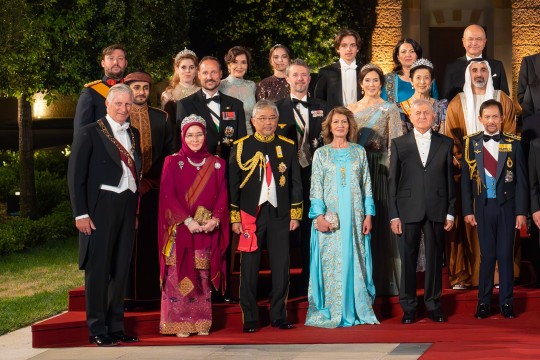
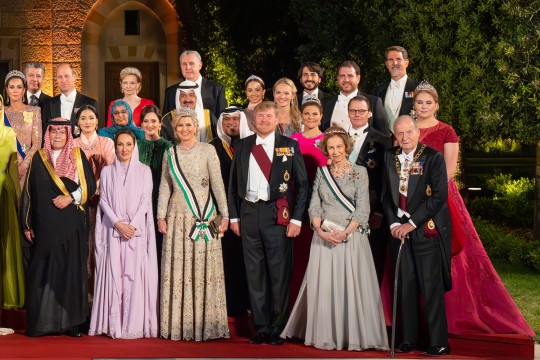
Official Portrait: King Abdullah II, Queen Rania, Crown Prince Hussein & Princess Rajwa of Jordan with distinguished guests (including foreign royals & political leaders) & family members ahead of the official dinner banquet held at Al Husseiniya Palace on the occasion of the Crown Prince’s wedding on 1 June 2023.
Who's who from left to right:
King Philippe of Belgium; Tunku Azizah & Abdullah of Pahang, the queen and king of Malaysia; First Lady Shanaz Ibrahim Ahmed & President Abdul Latif Rashid of Iraq; Sultan Hassanal Bolkiah of Brunei. Prince Theyazin of Oman; Crown Prince Haakon of Norway; Crown Prince Frederik & Crown Princess Mary of Denmark; Princess Hisako of Japan; Crown Prince Khaled bin Mohamed Al Nahyan of Abu Dhabi. Prince Sébastien of Luxembourg; Princess Beatrice of York; Ilham Yassin; Princess Salma; Barham Salih, former president of Iraq & wife Sarbagh Salih.
U.S. First Lady Jill Biden, President Paul Kagame of Rwanda & wife Jeannette Kagame. Prince Mateen of Brunei; Simeon Saxe-Coburg-Gotha & Margarita Saxe-Coburg-Gotha of Bulgaria; Princess Elisabeth of Belgium; Princess Muna; Hereditary Princess Sophie of Liechtenstein; First Lady May Mikati of Lebanon; Hereditary Prince Alois of Liechtenstein; Prime Minister Najib Mikati of Lebanon; Sheikha Moza of Qatar; Catherine, Princess of Wales; Prime Minister Masrour Barzani of Iraqi Kurdistan; Prince William; Khalid al-Saif.
Azza al-Sudairi; Queen Máxima and King Willem-Alexander of the Netherlands; Queen Sofía & King Juan Carlos of Spain. Queen Jetsun Pema of Bhutan; Sheikha Muna Al-Klaib & Sheikh Ahmad Al Abdullah Al Sabah of Kuwait; Salman bin Hamad Al Khalifa, prime minister and crown prince of Bahrain; Crown Princess Victoria & Prince Daniel of Sweden; Princess Catharina-Amalia of the Netherlands. Margareta, Custodian of the Crown of Romania & Prince Radu; Princess Iman; Princess Felicitas of Liechtenstein; Jameel Thermiotis; Prince Johann Wenzel of Liechtenstein; Prince Pavlos of Greece.
#Princess Rajwa#crown prince hussein#King Abdullah II#Queen Rania#Wedding#official portrait#princess iman#princess salma#prince hashem#Princess Muna#british royal family#belgian royal family#Dutch royal family#danish royal family#Norwegian Royal Family#swedish royal family#spanish royal family#japanese imperial family#tiara
54 notes
·
View notes
Text
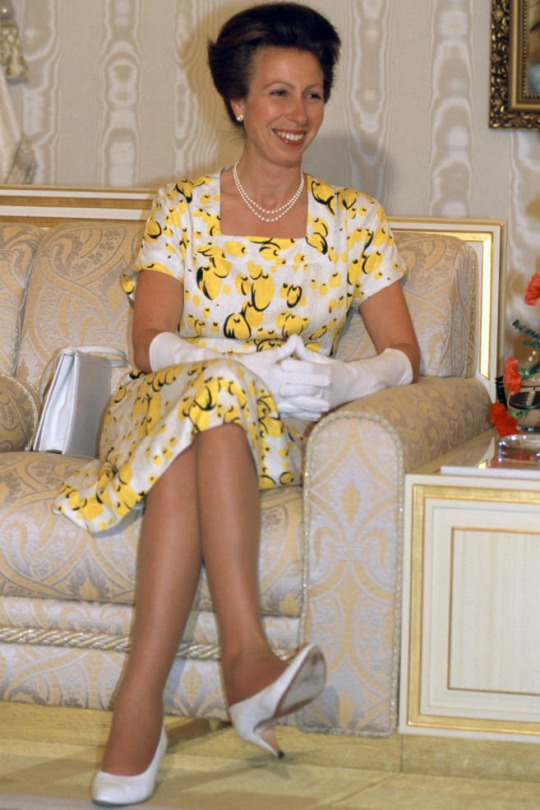


Princess Anne meeting Crown Prince Khalifa bin Zayed al Nahyan at Al Bateen Palace in Abu Dhabi during a visit to the United Arab Emirates in 1987
33 notes
·
View notes
Text
Members of other royal families who attended the coronation of Their Majesties, King Charles III and Queen Camilla at Westminster Abbey - 06/05/23
Europe
King Philippe and Queen Mathilde of Belgium 🇧🇪
Crown Prince Frederik and Crown Princess Mary of Denmark (representing the Queen of Denmark) 🇩🇰
Alois, Hereditary Prince and Sophie, Hereditary Princess of Liechtenstein (representing the Prince of Liechtenstein) 🇱🇮
Grand-Duke Henri and Grand-Duchess Maria Teresa of Luxembourg 🇱🇺
Prince Albert II and Princess Charlene of Monaco 🇲🇨
King Willem-Alexander and Queen Máxima of the Netherlands 🇳🇱
Crown Prince Haakon and Crown Princess Mette-Marit of Norway (representing the King of Norway) 🇳🇴
King Felipe VI and Queen Letizia of Spain 🇪🇸
King Carl XVI Gustaf and Crown Princess Victoria of Sweden 🇸🇪
Asia
King Hamad bin Isa Al Khalifa and Crown Prince Salman bin Hamad Al Khalifa of Bahrain 🇧🇭
King Jigme Khesar Namgyel Wangchuck and Queen Jetsun Pema of Bhutan 🇧🇹
Sultan Hassanal Bolkiah and Prince 'Abdul Mateen of Brunei 🇧🇳
Crown Prince Mishal Al-Ahmad Al-Jaber Al-Sabah of Kuwait (representing the Emir of Kuwait) 🇰🇼
Crown Prince Fumihito and Crown Princess Kiko of Japan (representing the Emperor) 🇯🇵
King Abdullah II and Queen Rania of Jordan 🇯🇴
Yang di Pertuan Agong and Raja Permaisuri Agong of Malaysia 🇲🇾
Theyazin bin Haitham Al Said, Crown Prince of Oman (representing the Sultan of Oman) 🇴🇲
Emir and Sheikha Jawaher bint Hamad of Qatar 🇶🇦
Sheikh Mansour bin Zayed Al Nahyan of Abu Dhabi (representing the Emir of Abu Dhabi and President of the United Arab Emirates) 🇦🇪
Prince Turki bin Mohammed Al Saud of Saudi Arabia (representing the King of Saudi Arabia) 🇸🇦
King Maha Vajiralongkorn and Queen Suthida of Thailand 🇹🇭
Africa
King Mswati III and Inkhosikati LaMbikiza of Eswatini 🇸🇿
King Letsie III and Queen 'Masenate Mohato Seeiso of Lesotho 🇱🇸
Princess Lalla Meryem of Morocco (representing the King of Morocco) 🇲🇦
Oceania
King Tupou VI and Queen Nanasipa’u of Tonga 🇹🇴
Ceremonial monarchs
Asantehene and Lady Julia of Asante 🇬🇭
Māori King Tuheitia Potatau Te Wherowhero VII and Queen Te Atawhai 🇳🇿
Members of defunct foreign royal families
Margrave Bernhard and Margravine Stephanie of Baden 🇩🇪
Tsar Simeon II and Tsaritsa Margarita of Bulgaria 🇧🇬
Landgrave and Langravine of Hesse 🇩🇪
Prince Philipp and Princess Saskia of Hohenlohe-Langenburg 🇩🇪
Margareta of Romania (Custodian of the Crown of Romania) and Prince Radu of Romania 🇷🇴
Queen Anne-Marie, Crown Prince Pavlos and Crown Princess Marie-Chantal of the Hellenes 🇬🇷
Crown Prince Alexander and Crown Princess Katherine of Yugoslavia 🇷🇸
8 notes
·
View notes
Photo

“The new Crown Prince of Abu Dhabi, Sheikh Khaled bin Mohamed bin Zayed Al Nahyan, seems like a nice, down to earth guy. In many photos and videos; he's seen smiling a lot when he's interacting with others. I notice his eyes disappear when he smiles, it's cute. He seems like a fun person to hang out with.” - Submitted by Anonymous
8 notes
·
View notes
Text
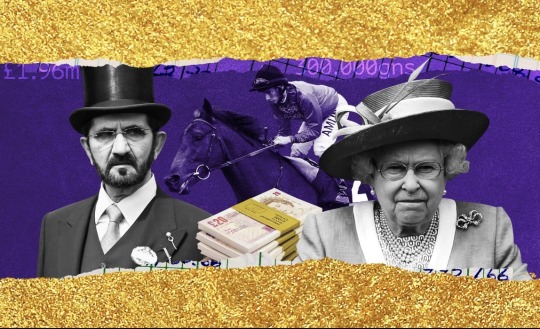
Royals made almost £2m from sale of horses received as gifts from prominent figures
Palace insists horses given to late queen, including 34 from emir of Dubai, were ‘personal gifts’
King Charles III and his late mother, Queen Elizabeth II, appear to have made almost £2m from the sale of horses that were gifts from prominent figures.
The Guardian has identified more than 40 horses that were apparently given to the queen by a Dubai sheikh, a Muslim religious leader and a Saudi royal.
Some of the horses were sold for profit by the queen, who was a passionate enthusiast for breeding and racing thoroughbreds. Others have been auctioned by the king, who in recent months has been selling some of the horses inherited from his mother, which are estimated to be worth at least £27m.
The queen’s most generous provider of racing and breeding stock by far is Sheikh Mohammed bin Rashid al-Maktoum, the emir of Dubai and prime minister of the United Arab Emirates. He appears to have been the source of at least 34 horses given to the royals.
The Aga Khan, Prince Shah Karim al-Husseini, the spiritual head of Shia Ismaili Muslims, appears to have given the royal family five horses, including Estimate, who gave the queen one of her most memorable victories on the track, in the 2013 Gold Cup at Royal Ascot.
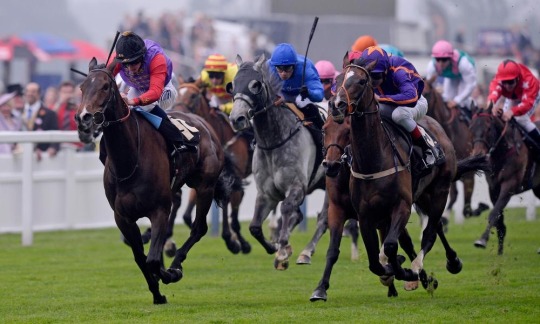
Estimate (L), ridden by Ryan Moore, wins the Gold Cup at Ascot in 2013. Photograph: Tom Jenkins/The Guardian
The queen also received a horse from Denford Stud, which is owned by Prince Faisal of Saudi Arabia, a half-brother of the crown prince, Mohammed bin Salman; and another from a breeding operation owned by Qatar’s al-Thani family.
In total, 41 horses that raced in the royal colours over the last 15 years were given to Elizabeth, according to a Guardian analysis.
Of those, 29 went under the hammer at a public auction at some point over the past decade, realising a total of £1.93m.
Buckingham Palace indicated that it regards the horses given to the queen as private gifts. A spokesperson said: “Personal gifts given to Queen Elizabeth by those who knew her late majesty privately would remain private, as they would for any other individual.”
They said the monarchy’s gifts policy “makes very clear that gifts are classed as personal when they are given by people whom the member of the royal family knows privately and not during, or in connection with, an official engagement or duty.”
What are the rules on gifts for the royal family?
The policy, introduced in 1995, distinguishes between “official gifts”, which are generally those received in connection with a royal’s official role or during the course of a formal engagement, and “personal gifts”, received from people who members of the royal family know personally, which are not publicly declared.
However, the gifts of horses to the queen raise questions about whether the policy is sufficiently clear to deal with circumstances in which the relationship between the Windsors and their benefactors is more blurred.
The queen’s relationships with Sheikh Mohammed and the Aga Khan were arguably both official and personal, having been developed through formal encounters and a mutual interest in horse racing.
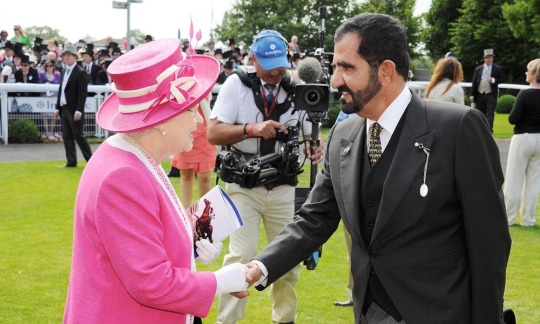
Queen Elizabeth II and Sheikh Mohammed at Epsom in 2011. Photograph: David M Benett/Getty Images
Sheikh Mohammed met the queen on several official occasions, according to the Court Circular, including at a reception in Buckingham Palace in November 2009, and in Abu Dhabi the following year when he hosted the queen and Prince Philip at the official launch of the design for the Zayed National Museum.
All the queen’s horses … and their £27m value to the new king
The queen and Sheikh Mohammed also attended the official signing of a “friendship treaty” at the Emirates Palace hotel in 2010. They appeared at various racing events in the UK, including at Royal Ascot in 2009 when Sheikh Mohammed joined the queen, Philip and Prince Andrew in their carriage.
Their relationship became more complicated in 2020 after Sheikh Mohammed was found by the high court to have abducted two of his own daughters and subjected his ex-wife to a campaign of intimidation. Palace officials subsequently briefed that the queen would no longer allow herself to be photographed with Sheikh Mohammed.
The court later awarded his ex-wife sole custody of their children after concluding that Sheikh Mohammed had used the military spyware Pegasus to carry out cyber-attacks on her and her lawyers, and published threatening poetry about her. A judge concluded he should have no face-to-face contact with the children, on account of his “abusive behaviour”.
Between 2013 and 2015, three horses presented to the queen by the Aga Khan, were sold for between £2,625 and £14,700.
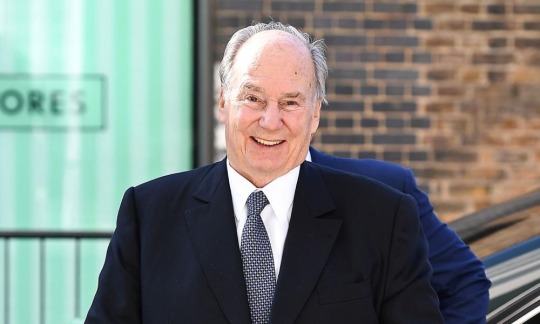
The Aga Khan in London in 2019. Photograph: Jeff Spicer/AFP/Getty Images
The queen and Prince Philip hosted the Aga Khan and his family at a dinner party at Buckingham Palace in July 2008 to celebrate his golden jubilee. Ten years later, she hosted him at another dinner party, this time at Windsor Castle, for his diamond jubilee. Both were official engagements documented in the Court Circular.
The queen appears to have had a long history of accepting – and at times even demanding – horses as gifts. The Times reported two years ago that she accepted gift horses from Sheikh Mohammed even after his wife fled to London.
Last month, the German magazine Der Spiegel said it had found state papers documenting how the queen had asked for two horses as a gift while on a state visit to West Germany in 1978. The country’s president approved the gift in the interests of good relations, despite it being the most expensive gift given to a visiting head of state since the end of the second world war.
Susan Hawley, the executive director of Spotlight, a transparency campaign group, said UK ministers would generally be expected to publicly declare similar gifts and, if they wanted to keep them, reimburse the government. She said it was “not at all clear” why royals should be subject to different guidelines.
“Rules on not accepting gifts and disclosing any that are made are there for a purpose – to protect the reputation of the UK and its public institutions from accusations of being open to influence to the highest bidder,” she said.
WTF sells a gift. For profit.
Thats just rude.
9 notes
·
View notes
Text
Pakistan and UAE Sign Five Deals to Strengthen Ties During Crown Prince’s Visit
On February 27, 2025, Pakistan and the United Arab Emirates (UAE) made headlines by signing five important agreements to boost their friendship and cooperation. This exciting moment happened during a special visit by Sheikh Khaled bin Mohamed bin Zayed Al Nahyan, the Crown Prince of Abu Dhabi, to Pakistan. It was his first official trip to the country, and Pakistani leaders rolled out the red…
0 notes
Text
आईआईटी दिल्ली में क्राउन प्रिंस ने किया अबू धाबी परिसर का उद्घाटन, जानें बयान में क्या कहा
Delhi News: भारतीय प्रौद्योगिकी संस्थान दिल्ली (आईआईटी दिल्ली) के अबू धाबी परिसर का क्राउन प्रिंस शेख खालिद बिन मोहम्मद बिन जायद अल नाहयान ने आज उद्घाटन किया। इस मौके पर प्रिंस ने स्नातक (यूजी) छात्रों के पहले बैच का भी स्वागत किया। भारतीय दूतावास द्वारा जारी एक आधिकारिक प्रेस ��िज्ञप्ति के मुताबिक 52 छात्रों का उद्घाटन बैच कंप्यूटर विज्ञान और इंजीनियरिंग और ऊर्जा इंजीनियरिंग में बी.टेक की डिग्री…
0 notes
Text


سمو الشيخ حمدان بن محمد بن راشد آل مكتوم، ولي عهد دبي نائب رئيس مجلس الوزراء وزير الدفاع🔻
افتتحنا اليوم معرض ومؤتمر الدفاع الدولي (آيدكس) في مركز أدنيك أبوظبي، بمشاركة أكثر من 1500 عارض من حول العالم، وبحضور كبار القادة العسكريين وصنَّاع القرار في قطاع الدفاع والأمن ... برؤية وتوجيهات صاحب السمو الشيخ محمد بن زايد آل نهيان تحول “آيدكس” لأحد أهم الفعاليات المتخصصة على المستوى العالمي.
وعلى هامش الافتتاح، التقيت عدداً من ضيوف الحدث ووزراء الدفاع المشاركين، وتفقدت ما تعرضه الشركات الدولية من منتجات وتقنيات حديثة، كما زرت أجنحة شركاتنا الوطنية التي تعرض أحدث الابتكارات الإماراتية في مجالات الدفاع والأمن...
ما نراه اليوم من تطور في قدراتنا الدفاعية والصناعات العسكرية الوطنية يعزز منظومة الأمن والتنمية في دولة الإمارات، ويساهم في تحقيق رؤية قيادتنا الرشيدة بترك بصمات إيجابية في منظومة الاستقرار الإقليمي والدولي.
_____________
His Highness Sheikh Hamdan bin Mohammed bin Rashid Al Maktoum, Crown Prince of Dubai, Deputy Prime Minister and Minister of Defence of the UAE🔻
Today, I inaugurated the International Defence Exhibition (IDEX) at ADNEC Abu Dhabi, which has grown into one of the world’s leading defence industry events, thanks to the visionary leadership of President HH Sheikh Mohamed bin Zayed Al Nahyan. This year’s edition has brought together over 1,500 exhibitors, along with senior military leaders and key decision-makers in the global defence and security sector.
During the event, I engaged with several guests and defence ministers. I also explored cutting-edge products and technologies showcased by international companies and visited the pavilions of UAE firms, which presented the latest Emirati innovations in defence and security.
The remarkable advancements in our defence capabilities and military industry reinforce the UAE’s security and development. Our progress reflects our leadership’s vision of contributing to regional and global stability.
Monday, 17 February 2025 الأثنين








23 notes
·
View notes
Text








8 December 2024 His Highness Sheikh Khaled bin Mohamed bin Zayed Al Nahyan, Crown Prince of Abu Dhabi and Chairman of the Abu Dhabi Executive Council, and His Highness Sheikh Hamdan bin Mohammed bin Rashid Al Maktoum, Crown Prince of Dubai, Deputy Prime Minister, and Minister of Defence, have attended the Formula 1 World season finale, the 16th Formula 1 Etihad Airways Abu Dhabi Grand Prix, alongside Their Highnesses, Sheikhs and state guests.
13 notes
·
View notes
Text
Fighting in Sudan, now in its third month, shows no signs of abating. The country’s two rival generals have flouted multiple cease-fires as they vie for control. Abdel Fattah al-Burhan, who first gained power after the 2019 ousting of longtime Sudanese dictator Omar al-Bashir and later cemented his position in a 2021 coup, is fighting Mohamed Hamdan Dagalo, known as Hemeti, who heads the paramilitary Rapid Support Forces (RSF).
Under Bashir, Hemeti led the RSF (formerly known as the janjaweed) alongside Burhan’s army in Darfur. After a so-called Sovereign Council was formed following the 2021 coup, Hemeti stepped in as Burhan’s deputy. However, their relationship became turbulent as both generals squabbled over power and how to merge the RSF into the Sudanese military. The clashes—which began on April 15—have so far resulted in hefty humanitarian costs, with more than 3,000 people dead and some 2.1 million internally displaced.
But the conflict between Burhan and Hemeti is not just a domestic squabble. Sudan is a bridge that links the Middle East and Africa, and its abundant natural resources mean the battle for Khartoum has taken on a regional dimension. Gulf heavyweights Saudi Arabia and the United Arab Emirates view the war as a chance to cement their hegemonic status in the Middle East. While Saudi Arabia supports Burhan, the UAE has backed Hemeti.
Given Burhan’s international legitimacy, the chances of an RSF victory over the Sudanese military are slim. More likely is that Burhan and Hemeti establish rival spheres of control in Sudan that mimic the situation in Libya, where an ongoing rivalry between various political and military factions has created a fragmented state with multiple centers of power. In such a scenario, the RSF would be a thorn in the side of Burhan and his external benefactors—giving the UAE added leverage in the country’s future and helping to cement Abu Dhabi as the emerging preeminent power in the Gulf.
Riyadh and Abu Dhabi—both members of the Gulf Cooperation Council (GCC)—have been ostensible allies for decades. But their relationship has always featured a hint of competition for regional primacy that is now escalating.
For a long time, tensions within the Middle East required Saudi Arabia and the UAE to prioritize partnership over competition. Now, as Riyadh normalizes ties with its archrival Tehran—and appears be to mediating in Lebanon, Syria, as well as among feuding Palestinian political parties—Saudi Crown Prince Mohammed bin Salman has taken his rivalry with the UAE up a notch.
Geopolitical changes have been buttressed by economic ones. In recent years, Saudi Arabia and the UAE focused on diversifying their economies away from oil, forging more prominent regional and international roles in aviation, sports, infrastructure, and other areas. Riyadh under Mohammed bin Salman has shifted from an identity dominated by Islam to hypernationalism, while Abu Dhabi under President Mohammed bin Zayed has adopted a cultural policy that promotes more religious diversity and acceptance.
Abu Dhabi and Riyadh began butting heads in 2009, when they disagreed over where to locate the GCC’s proposed central bank, which would have promoted a more unified Gulf economy and a common currency. The council agreed that the UAE would house the bank, only for Riyadh to pull out of the plan at the last minute without explanation. Neither the bank nor the currency has since come to fruition. Instead, tensions between Saudi Arabia and the UAE have bubbled to the surface—sometimes violently by proxy.
The UAE is considered a partner in Saudi Arabia’s ongoing war against Houthi rebels in Yemen. But since the conflict began in 2015, Riyadh’s and Abu Dhabi’s objectives gradually diverged, as Riyadh supported the internationally recognized government of Yemeni President Abed Rabbo Mansour Hadi, while Abu Dhabi opted to back the Southern Transitional Council. This gave the UAE control over many of Yemen’s ports and islands—and therefore access to the Bab el-Mandeb Strait and the Horn of Africa.
In 2019, fierce clashes broke out between the Southern Transitional Council and Hadi’s forces in a bid to control the port city of Aden. But the Saudi-Emirati rivalry in Yemen was not limited to ports. Reports leaked to Al Jazeera in 2018 showed that Riyadh had planned to construct a pipeline transporting Saudi oil to the Yemeni seaport of Nishtun on the border with Oman, which would have reduced the risk of any Iranian threats by bypassing the Strait of Hormuz. The project would have undermined the UAE’s key position in oil and gas transportation and given the kingdom more control within OPEC.
Outside the Middle East, Washington has also become a key venue for Saudi-Emirati competition. The rise of Mohammed bin Salman—who U.S. intelligence concluded ordered the 2018 murder of journalist Jamal Khashoggi—has caused the relationship between Riyadh and U.S. policymakers to become frosty in recent years. This gave the UAE a golden opportunity to replace Riyadh as Washington’s favorite Gulf military ally.
Abu Dhabi’s standing was only bolstered when it signed the U.S.-sponsored Abraham Accords to normalize ties with Israel in 2020. (The United States is currently promoting Saudi-Israeli normalization, to little bite from Riyadh so far.) While the United States suspended arms sales to Saudi Arabia over the war in Yemen, the Trump administration chose to supply its most advanced fighter jet, the F-35, to the UAE—although the Biden administration paused the sale for review. If the deal goes through, it would make the UAE the first Arab country to receive the plane.
In recent years, Saudi Arabia and the UAE have expanded their competition to Africa—and resource-rich, strategically located Sudan in particular.
Gulf countries have played a significant role in Sudan since Bashir’s ouster. Abu Dhabi and Riyadh immediately funded the Transitional Military Council, the junta that took over, with $3 billion worth of aid. At the time, Saudi and Emirati interests in Sudan were generally aligned, and both helped play a role in the country’s short-lived democratic transition. Both states also extracted concessions from Khartoum: Sudan provided military support for Saudi Arabia in Yemen, and the UAE mediated Khartoum’s accession to the Abraham Accords.
Saudi Arabia and the UAE have also long invested in Sudan’s economy. As of 2018, Abu Dhabi had cumulatively invested $7.6 billion in the country. Since Bashir fell, the UAE has added another $6 billion worth of investments that include agricultural projects and a Red Sea port. In October 2022, Riyadh announced that it would invest up to $24 billion in sectors of Sudan’s economy including infrastructure, mining, and agriculture.
As emerging Middle East hegemons, Riyadh and Abu Dhabi are now at odds—each seeking to control Sudan’s resources, energy, and logistics gateways by aligning with Burhan and Hemeti, respectively. While their interests in the country initially aligned—particularly when Bashir remained neutral during the Saudi-Emirati blockade on their foe Qatar—Burhan has since sought to thaw relations with Doha. The UAE gained trust in Hemeti because RSF fighters had been active in southern Yemen since 2015 and in 2019 expanded to Libya to back Gen. Khalifa Haftar, one of the country’s rival leaders who is backed by Abu Dhabi.
While Saudi Arabia has cooperated with Egypt in supporting Burhan, the UAE has collaborated with Russia in supporting the RSF through the paramilitary Wagner Group. The Wagner Group has been active in Sudan since 2017, when it signed contracts with the country’s resource ministry for projects in Darfur, where the RSF was active. Wagner in 2019 became active in Libya, fighting on behalf of Haftar. (After Wagner’s failed mutiny in Russia last month, its future is uncertain, though reports suggest the group is still operating “as usual” in the many countries where it is active.)
Abu Dhabi has kept silent about its alliance with the RSF. But reports suggest Hemeti has acted as a custodian of Emirati interests in Sudan, guarding gold mines controlled by Wagner; gold from these mines is then shipped to the UAE en route to Russia. The three-way relationship between the UAE, the RSF, and Russia via the Wagner Group was cemented by Russia’s February 2022 invasion of Ukraine, when Moscow became more dependent on gold and other finances to mitigate the impact of Western sanctions. The U.S. Treasury Department recently sanctioned two firms associated with Hemeti that operate in the gold industry, Al Junaid and Tradive. They are based in Sudan and the UAE. (Treasury also sanctioned two defense companies associated with Burhan.)
While the UAE has been fighting for gold, Saudi Arabia has worked tirelessly to brand itself as a peacemaker and humanitarian in Sudan. Riyadh has sponsored cease-fire talks with the United States in the Saudi city of Jeddah, provided aid to the Sudanese people both inside and outside the country, and helped evacuate many civilians out of Khartoum. Egyptian President Abdel Fattah al-Sisi—a Saudi ally—has also provided aid to the Sudanese military, particularly air support, in its bid to regain full control of the state.
Analysts have suggested that Egypt may be considering a full-scale invasion of Sudan in a bid to help Burhan fight the RSF. This would ensure that Saudi investments in Sudan are protected and also expand Riyadh’s influence into Africa. But, as Mahmoud Salem recently wrote in Foreign Policy, Egypt finds itself in a Catch-22: Cairo “does not have the resources or the desire to fight a war, yet it cannot afford to ignore the situation any longer.”
The fall of Sudan under the control of either Burhan or Hemeti—and thereby either the Saudi or Emirati sphere of influence—would shift the balance of power in the Gulf and escalate tensions between Riyadh and Abu Dhabi. But it is unlikely that the outcome of the war will be this clear-cut: Similar to Libya, Sudan is likely to fracture even further, perhaps along ethnic and tribal lines.
The conflict in Sudan is an opportunity for both Saudi Arabia and the UAE to expand their regional presence—and control. For Riyadh, a total victory for the Sudanese military would reinforce its stature as a leader in Arab and Islamic worlds. For the UAE, any RSF gains create leverage to weaken Riyadh’s grip over the Middle East—which would be a win for Abu Dhabi.
4 notes
·
View notes
Text
UAE to support environmental projects in Brazil
Erth Zayed Philanthropies will allocate USD 40 million to support initiatives involving the planting of date palms in Bahia state and combating plastic pollution in the Amazon.

Erth Zayed Philanthropies, an organization based in Abu Dhabi, United Arab Emirates, will donate USD 40 million to support environmental programs in Brazil, the UAE state news agency WAM reported on Wednesday (8). The donation follows the presence of the Crown Prince of Abu Dhabi, Khaled bin Mohamed bin Zayed Al Nahyan, at the G20 summit held in November in Rio de Janeiro. On the sidelines of it, he met with Brazilian President Luiz Inácio Lula da Silva.
Continue reading.
#brazil#brazilian politics#politics#united arab emirates#emirati politics#environmentalism#international politics#image description in alt#mod nise da silveira
3 notes
·
View notes